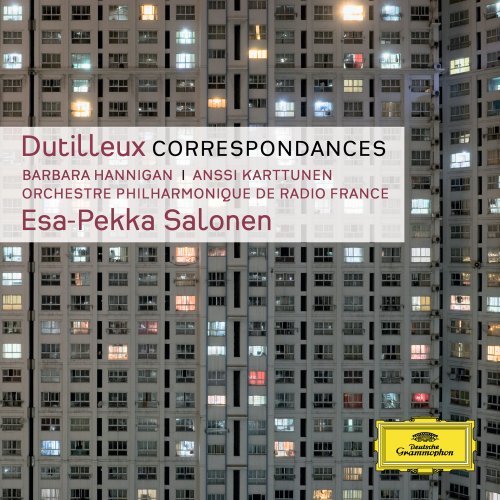DUTILLEUX Correspondances. Cello Concerto, ‘Tout un monde lointain’. The Shadows of Time
First recording for Dutilleux’s touchstone Correspondances
View record and artist detailsRecord and Artist Details
Composer or Director: Esa-Pekka Salonen
Genre:
Orchestral
Label: Deutsche Grammophon
Magazine Review Date: 05/2013
Media Format: CD or Download
Media Runtime: 67
Mastering:
DDD
Catalogue Number: 479 1180GH

Tracks:
| Composition | Artist Credit |
|---|---|
| Correspondances for Soprano and Orchestra |
Henri Dutilleux, Composer
Barbara Hannigan, Soprano Esa-Pekka Salonen, Composer Orchestre Philharmonique de Radio France |
| Concerto for Cello and Orchestra, 'Tout un monde l |
Henri Dutilleux, Composer
Anssi Karttunen, Cello Esa-Pekka Salonen, Composer Orchestre Philharmonique de Radio France |
| (The) Shadows of Time |
Henri Dutilleux, Composer
Esa-Pekka Salonen, Composer Orchestre Philharmonique de Radio France |
Author: David Gutman
A believer in the cross-fertilisation of the arts, seeking ‘correspondences’ between the different senses, Dutilleux’s recent works keep any number of conceptual and stylistic balls in the night air, reflecting a lifetime’s experience. A rapturous dreamlike atmosphere remains his most obvious stylistic hallmark, another being those jazz-derived bass-lines which emerge from time to time to nudge the music on its way. In any event, it is difficult to imagine a more sympathetic rendering of Correspondances (the title is that of a poem by Baudelaire not actually set). Its own poetic and actual connections take in a letter from Alexander Solzhenitsyn to Slava [Rostropovich] and Galina [Vishnevskaya], a timely reminder that it was the late great soprano who had the most to lose from the couple’s decision to defy the Soviet authorities and give the Nobel Prize-winner a refuge.
The other pieces have been widely performed and recorded. Work on The Shadows of Time began with the 50th anniversary of the end of the Second World War. Dutilleux, who endured the Nazi occupation of Paris, states that the music is partially concerned with ‘distant events whose intensity, in spite of the imprint of time, has never ceased to haunt me’. In alluding directly to the Holocaust in its third episode, he enters a hazardous aesthetic zone which perhaps only Steve Reich’s Different Trains has navigated with unqualified success. Individual listeners must decide whether the French veteran offers too easy a response. His brief text – ‘Pourquoi nous? Pourquoi l’étoile?’ (‘Why us? Why the star?’) – is given here by three boy trebles (recordings vary as to the precise solution) in oblique and discreet tribute to Anne Frank and all the innocent children of the world.
Between comes the well-established cello concerto Tout un monde lointain (1970), a terrific rendition from a Finnish artist perhaps still most familiar to London audiences from his stint as principal cellist of the London Sinfonietta. As with almost any music written for Mstislav Rostropovich, the Russian cellist’s own premiere recording is in a class of its own, its larger-than-life effect only partly a matter of close microphone placement. That insatiable communicator compels attention with every acrobatic wisp of sound, the sense of direction never in doubt. With Salonen at the helm you’ll hear more of the orchestral contribution, even if the sound itself seems a little airless and studio-bound. Tortelier’s passionately engaged account of The Shadows of Time was captured live in a much more resonant acoustic. Highly recommended even so, and a wonderful 97th birthday present for a musician who has patiently extended older French traditions of civility and high polish into an age of aesthetic meltdown.
Discover the world's largest classical music catalogue with Presto Music.

Gramophone Digital Club
- Digital Edition
- Digital Archive
- Reviews Database
- Full website access
From £8.75 / month
Subscribe
Gramophone Full Club
- Print Edition
- Digital Edition
- Digital Archive
- Reviews Database
- Full website access
From £11.00 / month
Subscribe
If you are a library, university or other organisation that would be interested in an institutional subscription to Gramophone please click here for further information.




